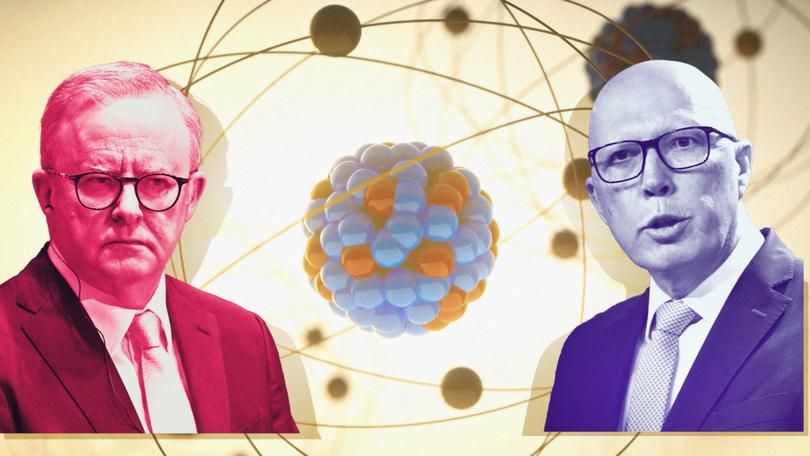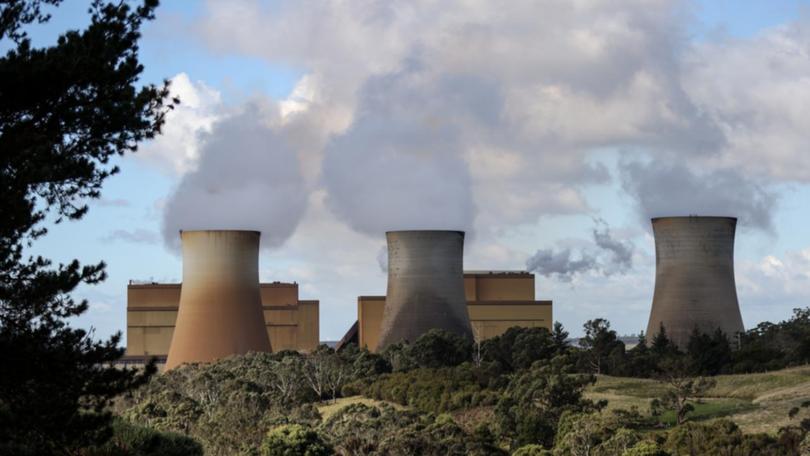Peter Dutton outlines ‘significant’ cost nuclear plan, says Labor’s option is ‘economic self-harm’
Peter Dutton has declared a renewable-only energy policy is an act of ‘economic self-harm’, as he ramped up his argument for Australia to add nuclear to the mix.

Peter Dutton has ramped up his pitch for Australia to add nuclear to the mix, declaring that while his proposal bears a “significant cost”, a renewable-only energy policy is an act of “economic self-harm”.
In a speech to the Committee for Economic Development of Australia on Monday, Mr Dutton warned nuclear was our “only chance to reach net zero by 2050”, as he took aim at the Labor government for transitioning away from coal and gas without a firmed up back-up.
Conceding a nuclear industry couldn’t be built up overnight, he said a future Coalition government would create an energy mix of renewables, firmed up by gas and nuclear in what he described as a more “pragmatic approach” to energy policy similar to international models.
Sign up to The Nightly's newsletters.
Get the first look at the digital newspaper, curated daily stories and breaking headlines delivered to your inbox.
By continuing you agree to our Terms and Privacy Policy.Mr Dutton announced in June a plan to build seven nuclear reactors to be operational by 2050 – two small modular reactors and five large-scale reactors – but has yet to release details about how much it would cost or how much energy it would generate.
He said on Monday the upfront cost would be “significant” but would be balanced out by the reactors’ 80-year lifespan, and that the Coalition would release more details “at a time of our choosing”.
“But, I can give you this guarantee; our nuclear plan will cost a fraction of the Government’s reckless $1.3 trillion plan,” he said.
He said a Coalition government would treat nuclear and renewables as “companions, not competitors”, warning that Labor’s approach of renewables only was “doomed to fail”.

“We can have cheaper, cleaner and consistent energy if we adopt nuclear power. And zero-emission nuclear power is our only chance to reach net zero by 2050,” Mr Dutton said.
“Nuclear power is better for our environment. We can maximise the highest yield of energy per square metre of environmental impact and minimise environmental damage.”
He offered up an example of the UAE, which recently completed a nuclear power plant with an output of 5.6 gigawatts, which he said was enough to supply 60 per cent of NSW’s energy needs using 617 acres.
To produce the same energy, he claimed 52 million solar panels across 192,000 acres would be needed.
“In other words, the nuclear plant delivers the same energy using less than 1 per cent of the land needed for solar,” Mr Dutton said.
Two new pieces of analysis, out last Friday, cast doubt over the Coalition’s plan. Independent think tank Institute for Energy Economics and Financial Analysis found nuclear power could increase Australian household power bills by $665 a year on average.
Meanwhile, government modelling forecasted the Coalition’s energy policy, based on assumptions nuclear would only produce four per cent of Australia’s 2050 energy needs, would contribute to a demand-supply gap of between 18 and 49 per cent by 2035.
The energy regulator’s reliability standard is 0.002 per cent.
Mr Dutton on Monday said the modelling was “an attempt to manipulate and mislead Australians”.
Questioned about how he could assure Australians they wouldn’t wind up paying more for their power bills under the Coalition’s plan, Mr Dutton pointed to international examples.
He said nuclear power couldn’t be switched on tomorrow, and that gas would have a role to play in the meantime “to get power prices down and to restore stability to our grid”.
Australia’s energy mix is currently comprised of about 40 per cent renewables, with Labor’s aim of increasing that to 82 per cent by 2030.
Mr Dutton said “weather-dependent energy cannot power a nation”, and called for “mature conversations” about Australia’s energy future.
Speaking ahead of Mr Dutton’s speech, Prime Minister Anthony Albanese called on the Opposition Leader to come clean on the details.
“We know it doesn’t add up,” Mr Albanese said.
Australian Conservation Foundation chief executive Kelly O’Shanassy said Mr Dutton’s comparison to the UAE - an autocratic regime - was “not relevant to the debate here”.
“Going nuclear would slow down the clean energy transition, pose reliability of supply issues in the next decade, increase household power bills, introduce the possibility of catastrophic accidents and create intergenerational risks in managing the radioactive waste – undoubtedly with a disproportionate burden on First Nations communities,” she said.
“Nuclear is a dangerous distraction and delay to effective climate action. Australia’s energy future is renewable, not radioactive.”
Clean Energy Council policy director Christiaan Zuur said nuclear “doesn’t make sense”.
“Put simply, this is a high-cost, high-risk experiment that Australia cannot afford,” he said.

